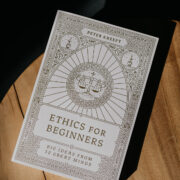In the burning furnace of our faith is fire of love for God and love of neighbor. These are the two hinges on which turn the whole Christian life. They are the two great commandments that Jesus distilled from all the many prescriptions and prohibitions of the law (cf. Matt. 22:34-40). Loving God comes first, followed by loving everyone and everything in his name. It’s that beautiful, simple, and yet difficult. One of the main challenges we face in our search for the love for which we long and to love in the way for which we are made is to confuse the love of God with our love of neighbor. Time and time again we end up mistaking human love as a substitute for divine love. Today the Church celebrates a saint who helps us avoid this error by putting the love of God first by letting ourselves be loved by Him.
St. Elizabeth of the Trinity was born in France on 18th July in 1880, the firstborn of her parents. After the death of her father, her family moved to a town called Dijon where there was a Carmelite convent near her home. The life of the sisters intrigued the young Elizabeth and she joined the community on 2nd August in 1901 at age twenty-one. Her five short years in the convent were intensely happy for the young Elizabeth, despite the suffering she endured because of the Addison’s disease that would eventually end her life on 9th November in 1906, at age twenty-six.
God’s love was near and intimate for Elizabeth. For her, we are within the mystery of the Triune God, and He dwells in us.
Apart from her chores in the community, the common life of prayer shared with the sisters and other responsibilities, Elizabeth had a great passion for music and writing. She was a talented pianist and liberally used the analogy of music to describe the spiritual life and how God seeks to attune us to his song of love. She wrote: “A praise of glory is a soul of silence that remains like a lyre under the mysterious touch of the Holy Spirit so that he may draw from it divine harmonies; it knows that suffering is a string that produces still more beautiful sounds” (Heaven in Faith). The darkness of suffering intensified as her illness worsened, and she wrote: “Believe that at those times he is hollowing out in your soul capacities to receive him, capacities that are, in a way, as infinite as he is himself. Try then to be wholly joyful under the hand that crucifies you’ (Letter 249).
God’s love was near and intimate for Elizabeth. For her, we are within the mystery of the Triune God, and He dwells in us. For this Carmelite saint, conversion is about attunement to the harmonies of God’s life within us and holiness is living in joyful melody with the dynamics of divine love. In her beautiful prayer to the Trinity, she wrote: “O my beloved Christ, crucified by love . . . I feel my weakness and ask You to clothe me with Yourself; to identify my soul with all the movements of Your soul, to overwhelm me, to possess me, to substitute Yourself for me that my life may be but a radiance of Your life.” For Elizabeth, her life of prayer and contemplation was like listening to the music of a song: “I listened to my Word whom I adore and I heard the song that is sung in the bosom of the Divine” (Poem 86).
As her earthly life drew to a close, her last words were ones of hope as she prepared to commend her soul to God’s mercy: “I am going to Light, to Love, to Life!” Her skill as a writer produced many letters and works, giving us an insight into the soul of this wonderful saint. While her writings are pregnant with these themes of joy, intimacy with God, and divine indwelling, she uses a curious phrase several times in a letter to a Mother Germaine, prioress of the convent at the time. She writes to her: “If you faithfully believe that He is still working, that He is loving you just the same, and even more: because His love is free and that is how He wants to be magnified in you; and you will let yourself be loved” (Let yourself be Loved, 6). In this letter, Elizabeth soothes her superior’s anxiety and encourages her by using the phrase “Let yourself be loved” no less than six times.

Why did Elizabeth use this phrase so often? If Elizabeth’s legacy to the Church is to encourage us to “Let ourselves be loved,” is she holding up a mirror to us when we don’t actually let ourselves be loved? Has she taken us to the heart of something essential in the spiritual life that we struggle to get right? If the answer is ‘yes,’ then she is another prophet and saint who helps us get right the relationship between love of God and neighbor. In his Confessions, St. Augustine admits that in his futile search for love, he was looking for it in the wrong places, in the things that God made rather than in God Himself. He describes “rushing headlong upon these things of beauty which you have made” (Confessions, 10, 27, 38).
Similarly, St, Gregory the Great offers this advice to his priests: “Let the pastor avoid the temptation of wishing to be loved by the faithful instead of by God and being too weak for fear of losing men’s affection” (Pastoral Rule, I, 2, 8). These insights from Augustine and Gregory can be summed up by the phrase made famous later by St. Elizabeth of the Trinity. It concerns the temptation not to allow ourselves to be loved by God or to fully accept the gift of God’s infinite affection. And when we fall victim to this, trouble always ensues. Like Augustine, we begin to seek fulfillment in things that can’t provide it and in the words of Gregory, we become vulnerable to dependency on people’s approval and affection. This leaves us unfree and happens when we are not grounded and rooted in the ultimate approval and affection of God alone.
St. Elizabeth of the Trinity’s prophetic message of “Let yourselves be loved” is timely and necessary.
The same danger exists for couples in love who are preparing for marriage. The love of God for each of them has brought them together and unites them in love. Their love for each other is a participation in God’s love for them and not a substitute for it. For if a bride or groom enters marriage without being grounded in divine love, they risk placing divine expectations on human shoulders, which always results in sadness and disappointment. Yet even the most zealous and faithful of us can fall prey to this temptation. We can be so eager to evangelize that we don’t take the time to pray, to be with the Lord, and to allow him to love us.
In a world that so easily forgets God and says ‘no’ to the love God offers, as more people drift from the mystery of divine love that only can satisfy them, St. Elizabeth of the Trinity’s prophetic message of “Let yourselves be loved” is timely and necessary. This is why Pope St. John Paul II, in his homily at her beatification in November 1984, spoke of her as “a brilliant witness to the joy of being rooted and grounded in love.” For Elizabeth, God was not an abstraction or an idea but a fire of unconditional love that changes us when we accept it and believe in it. Everything begins with this and on this does everything depend. “Letting ourselves be Loved” is allowing God to fill us up with Himself, to become like Himself so that we can offer Him joyfully to the world. For this lesson offered through St. Elizabeth of the Trinity, we are truly grateful.
St. Elizabeth of the Trinity, pray for us!
